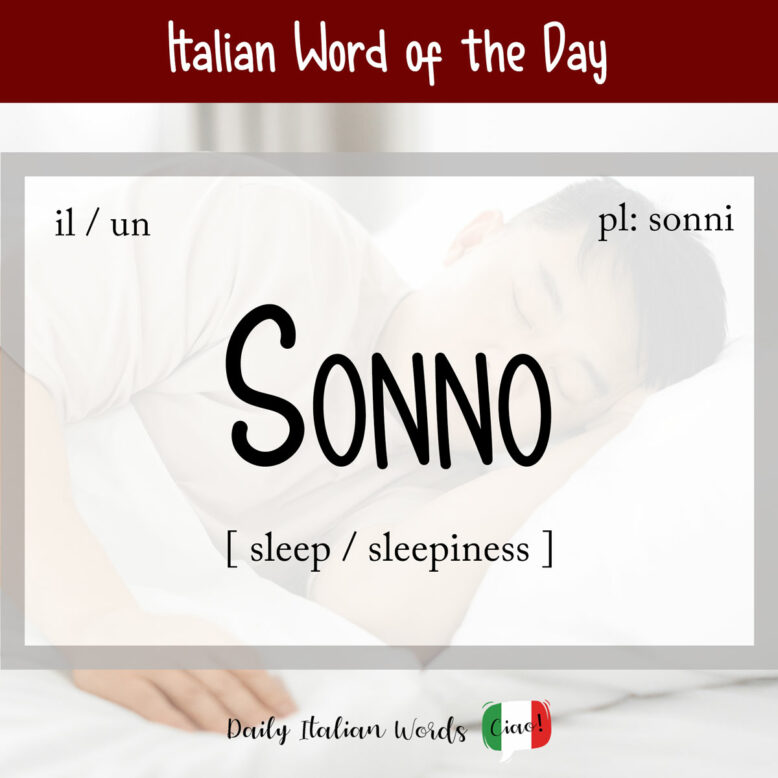If there’s one thing most of us likely don’t get enough of, especially those with young children, it’s sleep. The noun translates as sonno in Italian.
sonno
sleep / sleepiness

The word comes from Latin somnus, which derives from Proto-Italic *swepnos and Proto-Indo-European *swépnos, rooted in *swep- meaning “to sleep.”
It is a masculine noun that takes the following definite and indefinite articles:
- il sonno = the sleep
- un sonno = a sleep
- i sonni = the sleeps
- dei sonni = some sleeps
Here are a few of the most common verbs you will see used when talking about sonno in Italian.
- prendere sonno = to fall asleep / get to sleep (literally “to take sleep”)
- parlare nel sonno = to talk in one’s sleep
- rompere il sonno = to wake (literally “to break sleep”)
- conciliare il sonno = to induce / bring on sleep
- lottare con il sonno = to struggle to stay awake (literally “to fight with sleep”)
- recuperare il sonno = to make up for lost sleep / catch up on sleep
- perdere X ore di sonno = to lose X hours’ sleep
- cascare / cadere dal sonno = to be asleep on one’s feet (literally “to fall from sleep”)
Sto cascando dal sonno e non sono neanche le nove di sera!
I’m asleep on my feet and it’s not even 9pm!
In English, to describe the sensation of needing sleep, we typically use the verb to be with the adjective sleepy. In Italian, however, they prefer to use the verb avere (to have) with sonno (sleepiness) – literally “to have sleepiness.” Prepare yourself to hear the following phrases frequently in Italian:
- Ho sonno = I am sleepy
- Hai sonno? = Are you sleepy?
- Non ho sonno. = I’m not sleepy.
- Che sonno (che ho)! = I’m so sleepy!
Che sonno che ho. Continuo a sbadigliare!
I am so sleepy. I can’t stop yawning!
It is also common to hear Italians describe the quality of their sleep using avere il sonno along with the appropriate adjective. For example, avere il sonno leggero (“to have the light sleep”) means to be a light sleeper while avere il sonno pesante (“to have the heavy sleep”) means to be a heavy sleeper.
Important: Don’t confuse sonno (sleep) with the similar-sounding word sogno (dream)!

Sometimes, sleep-related expressions can be metaphorical. For instance, perdere il sonno means to lose sleep over something, indicating excessive worry. Conversely, far venire / mettere sonno (literally “to make sleep come / put sleep”) means to bore someone to death.
Questa lezione mette sonno.
This lesson is so boring / is putting me to sleep.
And while we’re on the topic of metaphorical uses of sonno, it’s worth mentioning that it can also refer to death, as in the expressions dormire il sonno eterno (“to sleep the eternal sleep”) or dormire il sonno dei giusti (“to sleep the sleep of the just”).
The expression dormire sonni tranquilli (literally “to sleep peaceful sleeps”) means that a person is serene and at peace with themselves, allowing them to have restful and undisturbed sleep.
Sonno can also mean peace, as in silence with no movement or activity. It can be used to describe the state of a peaceful location for example.
Il villaggio era immerso nel sonno.
The village was sound asleep.
The diminutive of sonno is sonnellino, and it is used to refer to a light sleep or naps, usually taken during the day. It is often used to describe the kind of nap a child takes once or twice a day.
Mio figlio non fa più il sonnellino pomeridiano.
My son no longer has an afternoon nap.

If you’re out late with friends or indulge in a big meal, you might suddenly be hit by a colpo di sonno (literally “a strike of sleepiness”). This term describes the feeling of unexpectedly falling asleep without warning. While the verb doze off captures its casual sense, it can also refer to the medical condition of sudden-onset sleep or Narcolepsy.
A person who suffers from a disturbo del sonno (sleep disorder) may have to go for terapia del sonno (sleep therepy).
Did you know that…?
It is recommended that the average adult get at least 7 hours of sleep each night. So, if you wake up (svegliarsi) at 6 a.m., you should go to bed (andare a letto) by 11 p.m. at the latest. Children, on the other hand, should get at least 10 to 13 hours of sleep, including naps (sonnellini).
Heather Broster is a graduate with honours in linguistics from the University of Western Ontario. She is an aspiring polyglot, proficient in English and Italian, as well as Japanese, Welsh, and French to varying degrees of fluency. Originally from Toronto, Heather has resided in various countries, notably Italy for a period of six years. Her primary focus lies in the fields of language acquisition, education, and bilingual instruction.


